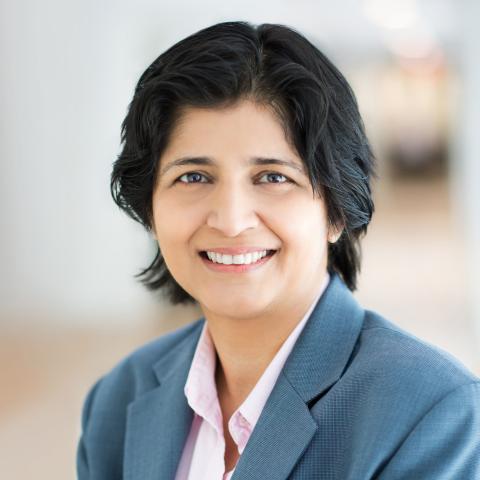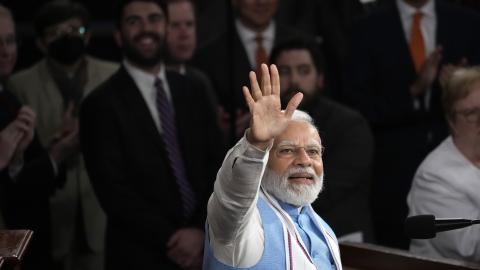Prime Minister Narendra Modi’s inaugural state visit to the United States has culminated in the next big steps in the India-US strategic partnership. In this free-wheeling conversation, Manish Chand speaks to Dr Aparna Pande, a South Asia expert at Hudson Institute and well-known author based in Washington DC, to discuss the long-term impact of PM Modi’s visit for the future of India-US partnership, often called the defining partnership of the 21st century. Dr Pande is widely recognised for her numerous critically acclaimed books, including “Making India Great: The Promise of a Reluctant Global Power.”
Excerpts from the interview:
Q) There is an immense buzz and frenzy surrounding Prime Minister Modi’s inaugural state visit to the United States. Commentators and experts have used an exhaustive range of adjectives to portray this visit. With all this hype, do you think PM Modi’s visit has lived up to soaring expectations?
A) The US India joint statement reflects the diversity of the partnership and the detailed deliverables, from trade and commerce to space and skilled development, semi conductors to jet engines, and clean energy to sustainable development. I believe this visit has lived up to expectations, encompassing both symbolic and substantive aspects. From a symbolic perspective, it holds significance as the third official state visit by an Indian leader, coinciding with President Biden’s third state visit as well. There was a massive display at the White House and a state dinner, Prime Minister Modi’s address to Congress, and various other diaspora events. But there’s a substantive element, and the three parts of the substantive element are, one, the really strong and deepening defence partnership. India and the US have never had a Defence Partnership. The defence relationship only dates back to 2005. The jet engine deal and the purchase of the Predator drones are huge for the India-US partnership.
Secondly, there is a crucial technology aspect to consider. The iCET (Indo-US Cooperation in Emerging Technologies) initiative, signed earlier this year in January, encompasses both civilian and defence technologies. Notably, startups from both nations will collaborate with each other in this regard. India has long expressed the view that the United States hesitates to share high-tech and advanced technology with them. However, this time around, the US is affirming that its private sector will indeed share such high-end technology with India, and they are committed to alleviating the challenges posed by Export Control regulations that have traditionally impeded this process.
And the third component revolves around the robust people-to-people dynamic. It is important to acknowledge that the Vice President herself has Indian heritage, and a significant portion of the Democratic base comprises Indian Americans. Indian Americans have consistently shown overwhelming support for the Democratic Party. Consequently, the current administration recognises the significance of Indian Americans, not just as Vice Presidents, senators, congressmen, mayors, or contributors to political campaigns, but also as voters and individuals who contribute to the broader diaspora. They hold prominent roles in universities, Silicon Valley, and numerous other sectors across the nation. Hence, this three-part dynamic is substantive, as it involves universities and the private sector contributing investments and technology to propel the iCET initiative forward.
Q) You mentioned technology, a major highlight of the visit. In a way, this visit can be seen as the realisation of the promise made during the historic nuclear deal signed in 2006, which aimed to dismantle the technology denial regime. Now the question arises: Will India gain access to critical technologies?
A) Both sides perceive it as the next significant stride in their relationship. This is why it involves the national security advisers of both nations, rather than various ministries and departments. The belief is that the White House and the Prime Minister’s Office will be able to ensure smooth progress. Hence, the involvement of the two national security advisers is crucial. NSA Jake Sullivan has referred to the iCET initiative as the next major development in the India-US relationship.
Secondly, considering the ongoing conflict in Ukraine, it becomes less probable for Russia to fulfill India’s demands or provide the necessary high-end technology that India requires. Moreover, Russia’s reliance on Chinese technology poses a challenge for India, as India is cautious about incorporating anything of strategic significance that is linked to Chinese or China-based technology.
The third aspect pertains to the significance of closer collaboration between India and the US, which holds great personal importance to President Biden. Going back to his time as a senator and as the chairman of the Senate Foreign Relations Committee, as early as 2006, President Biden expressed that the defining partnership would be between India and the US. This sentiment continued during his tenure as vice president, and now as the President, he remains committed to advancing this partnership. Hence, for President Biden, this collaboration holds both personal and strategic significance.
Q) Speaking about access to technology, which is crucial for India’s ascent as a significant global player, the US has traditionally been highly protective of its most advanced and coveted technologies, often referred to as the “crown jewels.” However, there are indications that India might gain access to one such crown jewel: jet propulsion technology, through the jet engine deal. Despite the grandeur and glamour surrounding the visit, there remains a hint of scepticism regarding whether India will truly receive the authentic and substantial technology it desires.
A) India and the US do not possess a formal security alliance, nor are they security allies. Traditionally, the US shares technology primarily with its security allies, reserving the highest-end technologies for those relationships. What India is requesting from the United States is to share such high-end technology with a non-military ally, which is unprecedented in the American apparatus. Moreover, India has historically maintained close military ties with Russia, utilising Russian-made equipment extensively.
From the US perspective, a concern may arise regarding the need for guarantees that the shared technology will not find its way to Russia or China, both being US competitors. While the US desires India’s alignment on its side, it necessitates an initial conversation akin to a friendly cup of tea or coffee to establish trust. The partnership between GE and HAL (Hindustan Aeronautics Limited) serves as the first example. If their collaboration proves successful, and technology remains securely shared, it will set a positive precedent for further collaborations between American and Indian companies. Building trust through these initial steps is essential, as without them, concerns and issues may impede progress. It is worth noting that while India has not shared all of its technology, the question of trust also exists from the American side.
Q) Hence, as this cooperation continues to evolve, it is likely that these issues will be addressed and resolved. Another noteworthy aspect of the visit is the extent to which the Biden administration has gone all out to make it exceptional. Various special gestures have been included, one of them being the invitation extended to Prime Minister Modi to address a joint session of the US Congress. Reflecting back on his speech in 2016, after a span of seven years, what do you anticipate that members of Congress are eager to hear from Prime Minister Modi? While there may be points of disagreement, what are your expectations amidst these areas of dissonance?
A) I must say, a lot has happened in seven years. Therefore, the Congress has passed a couple of resolutions in recent months emphasizing the importance of supporting India. The Select Committee discussed the idea of making India NATO plus five. Both the Senate and the House have passed resolutions stating that while passing the NDAA, the Defence Authorization Act, we must support India and its military so that it can effectively counter China and reduce its dependence on Russia. The US Congress comprehends the critical partnership India represents, as perceived by congressmen, senators, and congresswomen. It is important to note that this understanding extends beyond being a mere security ally.
Secondly, does the Indian side also comprehend, just as the US comprehends India’s obligations concerning Russia and, more visibly, China, whether India also understands the American obligations regarding Russia, China, Taiwan, and other matters? Understanding the other side doesn’t require agreeing with the other side. While India may not take overt actions concerning Taiwan, would India be willing to provide support in line with what the United States, for instance, as seen in the Galwan incident in 2020 when India deployed Predator drones. Similarly, now that India and the US have signed multiple agreements, such as allowing refuelling of American ships, similar to what was done in the 1990s, these actions should be reciprocal rather than based on a quid pro quo arrangement.
And third, they would appreciate reassurance that India, like the United States, is a flawed yet democratic nation. It is acknowledged that all democracies have imperfections, and we strive to uphold the ideals enshrined in our respective Constitutions. Despite our failures, the objective remains to continually strive towards those ideals, even if we fall short at times. These are the aspects that Congress seeks, wherein a partner and friend understand the essence of friendship within the context of a broader security alliance. Reciprocity and the camaraderie of a partner are crucial elements.
Q) The original premise of the nuclear deal was to facilitate the rise of India as a major power. Do you think President Biden is committed to accelerating India’s emergence as a global player?
A) This belief that India’s rise is important for the United States and even American national interest actually goes back two-three decades. It goes back to President Clinton and every president since. Every President from President Clinton onwards has argued that India’s rise is important for the United States and it is a policy of strategic altruism, your rise is good for me irrespective of what your rise does. That India’s growth economically, militarily, its soft power, all of that is good for the United States. And so every administration has done it, Democratic or Republican and that will continue.















